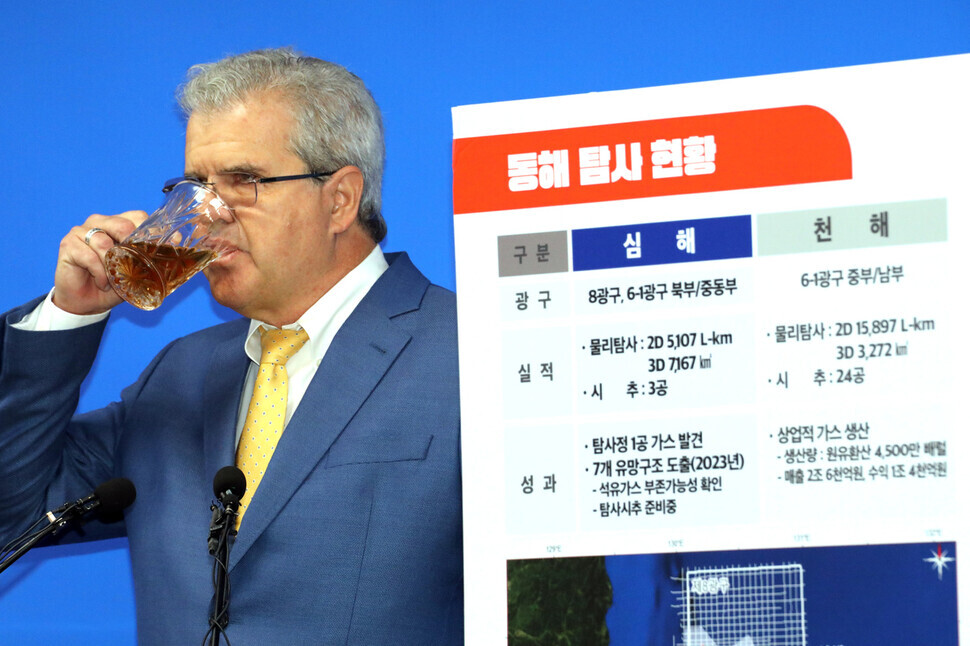hankyoreh
Links to other country sites 다른 나라 사이트 링크
[Editorial] Thorough audit, evaluation of oil test drilling are needed

There are various questions surrounding state approval for exploratory deepwater drilling off the southeastern coast of South Korea in the hopes of discovering reserves of oil and gas. Vitor Abreu, the CEO of US geoscience firm Act-Geo, the firm commissioned by the South Korean government to determine the feasibility of digging for oil and gas, gave a press conference in Sejong on Friday in an attempt to clear these questions up.
Abreu said a lot during his press conference, but he did not provide any clear answers to the aforementioned questions. This was a given. There was no way for Act-Geo to explain the various irregularities in the government’s decision-making process or the president’s abrupt way of announcing it. In order for the project to proceed smoothly, the administration will have to accept a thorough National Assembly audit of the approval process for drilling.
Abreu claimed that Act-Geo analyses revealed that areas not previously scouted for drilling suggest the presence of seven prospects that could hold between 3.5 billion and 14 billion barrels of oil and gas in the waters around Yeongil Bay, which is situated off the coast of Pohang, in Korea’s southeast. Regarding the projection of a 20% success rate, he did not provide an adequate explanation, instead essentially saying Korea would have to drill to find out for sure.
The most suspicious development involves Australian energy firm Woodside Energy, which pulled out of a partnership with the South Korean government that granted it 50% equity in an oil project. Woodside withdrew in January of last year, six years before the partnership was scheduled to end. In one of its annual reports, Woodside declared that it had exited “blocks no longer considered prospective.” The Korea National Oil Corporation (KNOC) then commissions another firm, Act-Geo, who declares just a little over a year later that the project is not only viable but likely to be fruitful. The president then declares in an unannounced briefing that the state will sponsor exploratory drilling. To earn public trust in this project, Act-Geo needs to submit its data regarding new prospects to a reliable third-party reviewer.
South Korea relies on foreign sources for 95% of its energy needs. The discovery of a large amount of oil and gas would be a welcome revelation. Yet we must remember the catastrophic failure of the Lee Myung-bak administration’s crude oil field project, which mobilized KNOC to invest a whopping 1 trillion won (US$724.6 billion) that ended up going almost entirely to waste. Exploratory drilling for oil in the East Sea is expected to cost at least 500 billion won (US$362.3 million) — which will all be for nothing if no oil is found.
Since the National Assembly will need to approve the project’s budget, a thorough audit and evaluation are in order. If additional reviews and analyses confirm the project’s commercial viability, then private equity from both domestic and overseas firms will want to get in on the project, thereby minimizing the financial exposure of KNOC and the South Korean government. So there is no reason they should oppose such an audit.
Please direct questions or comments to [english@hani.co.kr]

Editorial・opinion
![[Editorial] It’s time for us all to rethink our approach to North Korea [Editorial] It’s time for us all to rethink our approach to North Korea](https://flexible.img.hani.co.kr/flexible/normal/500/300/imgdb/original/2024/0621/7517189559819182.jpg) [Editorial] It’s time for us all to rethink our approach to North Korea
[Editorial] It’s time for us all to rethink our approach to North Korea![[Column] Why empty gestures matter more than ever [Column] Why empty gestures matter more than ever](https://flexible.img.hani.co.kr/flexible/normal/500/300/imgdb/original/2024/0619/7217187833478369.jpg) [Column] Why empty gestures matter more than ever
[Column] Why empty gestures matter more than ever- [Editorial] Seoul’s part in N. Korea, Russia upgrading ties to a ‘strategic partnership’
- [Column] The tragedy of Korea’s perpetually self-sabotaging diplomacy with Japan
- [Column] Moon Jae-in’s defense doublethink
- [Column] S. Korea-China cooperation still has a long way to go
- [Editorial] Seoul must use tact and diplomacy to check deepening Russia-NK ties
- [Editorial] Thorough audit, evaluation of oil test drilling are needed
- [Editorial] Yoon prioritizes his administration over South Korea’s safety once again
- [Column] The monumental shift in N. Korea’s nuclear program that never happened
Most viewed articles
- 1[Editorial] It’s time for us all to rethink our approach to North Korea
- 2North Korea’s real motive for publishing the full text of new treaty with Russia
- 3[News analysis] N. Korea’s new pact with Russia is ‘mirror image’ of Yoon’s alliance with US
- 4Seoul hints at lethal weapons aid to Ukraine to put pressure on Russia
- 5Seoul decries N. Korea-Russia mutual defense pact as ‘absurd’
- 6Hot weather hat trick to send the mercury soaring in Korea
- 7[Editorial] Seoul’s part in N. Korea, Russia upgrading ties to a ‘strategic partnership’
- 8[Editorial] Fortified N. Korea-Russia ties should be a wakeup call for Seoul
- 9Putin, Kim pledge ‘mutual assistance’ in event of outside aggression
- 10[Photo] K-pop: For everyone, everywhere